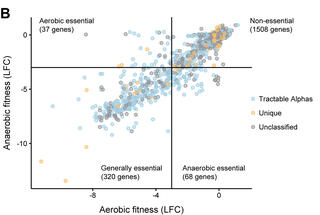The genetics of aerotolerant growth in Zymomonas mobilis

Using a customized tool called CRISPRi, researchers selectively turned off each of the 1,915 protein-coding genes in Z. mobilis to identify those required for aerobic and anaerobic growth as well as those generally essential for survival.
The Science
Reduced genome bacteria are organisms with simple genetic blueprints that are easier to study and modify than bacteria with larger genomes, where redundancy can hide the function of individual genes. With fewer than 2,000 protein-encoding genes, Zymomonas mobilis has fewer than half the genes of its closest relatives, is good at converting sugar into ethanol, and able to thrive with or without oxygen. This combination of simplicity, efficiency, and versatility make Z. mobilis a promising model for understanding biology and a potential industrial workhorse. Yet the genes required for growth in various conditions have not been well studied. Here scientists used a customized tool to identify and characterize Z. mobilis genes that are generally essential for survival as well as those required for aerobic or anaerobic growth.
The Impact
Plans to slow climate change call for increased use of sustainable plant-based fuels and chemicals to replace fossil fuels and petrochemicals. Bacteria can convert sugars and other chemicals in plants into these bioproducts, but the complexity of biological systems makes it hard to understand how these microbes function. Bacteria with experimentally reduced genomes are often better suited for industrial conditions, but genetic modifications can weaken them if their physiology isn’t well understood. However, bacteria with naturally reduced genomes are genetically simple yet environmentally robust.
Summary
Scientists with the Great Lakes Bioenergy Research Center used a genetic screening tool called CRISPRi to selectively deactivate – or “knock down” the function – of each of Zymomonas mobilis’ 1,915 genes in order to identify genes that are essential for aerotolerant or anaerobic growth or generally essential across both conditions.
The results, published in the journal mBio, showed DNA repair gene recJ was critical only for aerobic growth but reduced the mutation rate under both conditions. Genes encoding the F1FO ATP synthase and Rhodobacter nitrogen fixation (Rnf) respiratory complex are required for the anaerobic growth. Rnf knockdown strains accumulated isoprenoid biosynthesis intermediates, suggesting a key role for Rnf in powering essential biosynthetic reactions.
Contact
Amy Enright
University of Wisconsin–Madison
alenright@wisc.ed